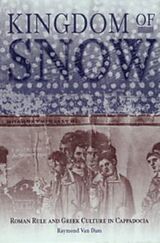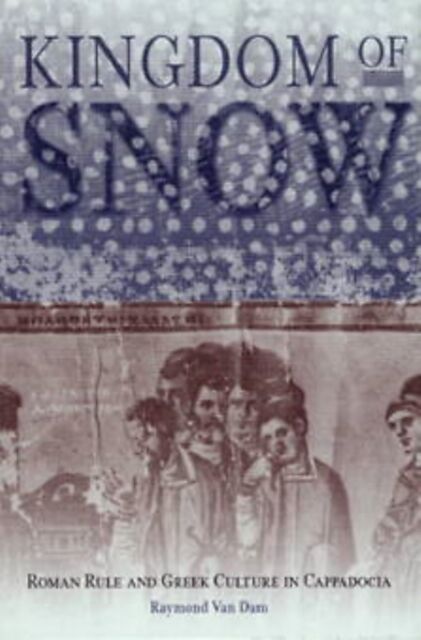Kingdom of Snow
Einband:
Fester Einband
EAN:
9780812236811
Untertitel:
Roman Rule and Greek Culture in Cappadocia
Genre:
Religion & Theologie
Autor:
Raymond van Dam
Herausgeber:
University of Pennsylvania Press
Anzahl Seiten:
336
Erscheinungsdatum:
27.09.2002
ISBN:
978-0-8122-3681-1
Informationen zum Autor Raymond Van Dam Klappentext "Essential reading for theology students and any inquiry into the world of late antiquity."--Religious Studies Review Cappadocia had long been a marginal province in the eastern Roman empire, high on a rugged plateau in central Asia Minor and hardly influenced by classical Greek culture. But during the fourth century emperors visited repeatedly as they traveled between Constantinople and Antioch. In Cappadocia they met provincial notables and prominent churchmen, including Basil of Caesarea, his brother Gregory of Nyssa, and their friend Gregory of Nazianzus. These three Cappadocian Fathers were already competing with local landowners over the distribution of resources. As patrons representing their communities, they negotiated with provincial administrators and presented petitions to the imperial court. They also confronted emperors over Christian orthodoxy and Greek culture. Kingdom of Snow investigates the impact of Roman rule in a remote province and the fate of Greek culture in an increasingly Christian society. The extensive writings of the Cappadocian Fathers combine to make Cappadocia one of the best-documented regions in the later Roman empire. Raymond Van Dam highlights the sometimes passionate relationships among bishops, local notables, imperial magistrates, and emperors as they struggled to gain prestige and power. In the drama of their personal confrontations they measured themselves and found their identities. Raymond Van Dam is Professor of History at the University of Michigan and author of the companion volumes and , both also available from the University of Pennsylvania Press. Zusammenfassung Kingdom of Snow investigates the impact of Roman rule in Cappadocia and the fate of classical Greek culture in an increasingly Christian society. Inhaltsverzeichnis Introduction BADLANDS 1. "The Viper Died": Local Notables and Imperial Rule 2. "The Hook Hidden in the Bait": The Rewards of Giving 3. "The Singing of the Sirens": Service in the Imperial Administration 4. The Highlander EMPIRE AND PROVINCE 5. "Surpass Me with Your Generosity": Provincial Governors and Tax Assessors 6. "Men in an Oven": Emperors in Cappadocia 7. "Birds Cowering Before an Eagle": Basil and Valens' Court at Antioch 8. "Everything Yields to Theodosius": Gregory of Nazianzus at Constantinople CULTURE WARS 9. "A True Hellene Among the Cappadocians": Julian in Asia Minor 10. Basil's "Outline of Virtue" 11. Gregory of Nazianzus and the Philosopher Emperor Epilogue: Admonishment and Compassion Abbreviations Notes Editions and Translations 1. The Cappadocian Fathers 2. Ancient Authors and Texts Bibliography Index ...
Autorentext
Raymond Van Dam
Klappentext
"Essential reading for theology students and any inquiry into the world of late antiquity."--Religious Studies Review
Cappadocia had long been a marginal province in the eastern Roman empire, high on a rugged plateau in central Asia Minor and hardly influenced by classical Greek culture. But during the fourth century emperors visited repeatedly as they traveled between Constantinople and Antioch. In Cappadocia they met provincial notables and prominent churchmen, including Basil of Caesarea, his brother Gregory of Nyssa, and their friend Gregory of Nazianzus. These three Cappadocian Fathers were already competing with local landowners over the distribution of resources. As patrons representing their communities, they negotiated with provincial administrators and presented petitions to the imperial court. They also confronted emperors over Christian orthodoxy and Greek culture.
Kingdom of Snow investigates the impact of Roman rule in a remote province and the fate of Greek culture in an increasingly Christian society. The extensive writings of the Cappadocian Fathers combine to make Cappadocia one of the best-documented regions in the later Roman empire. Raymond Van Dam highlights the sometimes passionate relationships among bishops, local notables, imperial magistrates, and emperors as they struggled to gain prestige and power. In the drama of their personal confrontations they measured themselves and found their identities.
Raymond Van Dam is Professor of History at the University of Michigan and author of the companion volumes and , both also available from the University of Pennsylvania Press.
Zusammenfassung
Kingdom of Snow investigates the impact of Roman rule in Cappadocia and the fate of classical Greek culture in an increasingly Christian society.
Inhalt
Introduction
BADLANDS
1. "The Viper Died": Local Notables and Imperial Rule
2. "The Hook Hidden in the Bait": The Rewards of Giving
3. "The Singing of the Sirens": Service in the Imperial Administration
4. The Highlander
EMPIRE AND PROVINCE
5. "Surpass Me with Your Generosity": Provincial Governors and Tax Assessors
6. "Men in an Oven": Emperors in Cappadocia
7. "Birds Cowering Before an Eagle": Basil and Valens' Court at Antioch
8. "Everything Yields to Theodosius": Gregory of Nazianzus at Constantinople
CULTURE WARS
9. "A True Hellene Among the Cappadocians": Julian in Asia Minor
10. Basil's "Outline of Virtue"
11. Gregory of Nazianzus and the Philosopher Emperor
Epilogue: Admonishment and Compassion
Abbreviations
Notes
Editions and Translations
1. The Cappadocian Fathers
2. Ancient Authors and Texts
Bibliography
Index

Leider konnten wir für diesen Artikel keine Preise ermitteln ...
billigbuch.ch sucht jetzt für Sie die besten Angebote ...
Die aktuellen Verkaufspreise von 6 Onlineshops werden in Realtime abgefragt.
Sie können das gewünschte Produkt anschliessend direkt beim Anbieter Ihrer Wahl bestellen.
Loading...
Die aktuellen Verkaufspreise von 6 Onlineshops werden in Realtime abgefragt.
Sie können das gewünschte Produkt anschliessend direkt beim Anbieter Ihrer Wahl bestellen.
| # | Onlineshop | Preis CHF | Versand CHF | Total CHF | ||
|---|---|---|---|---|---|---|
| 1 | Seller | 0.00 | 0.00 | 0.00 |
